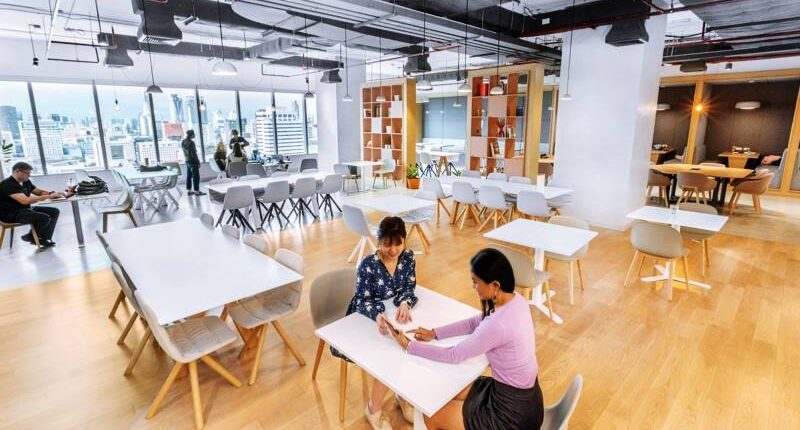No products in the basket.
As hybrid working becomes the norm, companies will be seeking sites that offer smart tech, space for collaboration and ‘sanctuaries’ for wellbeing.
Now that hybrid working has entered the mainstream, companies are making changes to the way they operate, such as downsizing their real estate footprint.
Landlords need to capitalise on the hybrid trend by adding flexspace to their portfolio, because what employers want in an office has significantly changed in the post-pandemic world of work.
Flexibility
The shift towards flexspace was already well under way before Covid-19 but the pandemic has accelerated the speed of adoption.
This has led to an increase in demand for shorter leases, with the option for employees to work from flexible workplaces closer to their homes. In the new world of work, office space that can be reconfigured to fit the occupier’s changing requirements, and spaces for connecting and collaboration and meeting rooms, are of particular importance.

A study by Verdantix for technology platform Essensys, examined the key factors that are ‘driving demand for flexible workspaces’.
“It’s about giving tenants flexibility, a consistent experience and easy movement across an entire network of spaces,” says Jeremy Bernard, North America CEO for Essensys, adding that, “86 percent of landlords said [lease flexibility] was either an influential or very influential factor in driving growth for flexspace.”
Coincidentally, tenants also rated lease flexibility as one of the most important market trends, with 66 percent labeling it as very important.
Jeremy Bernard, North America CEO for Essensys
Differentiated spaces
In the coming months, landlords will need to be much more innovative in providing diverse interior spaces to cater for different types of work and to boost productivity. Top of many companies’ wish lists will be interactive zones for collaboration, whether that means meeting rooms or more informal lounge and breakout areas – a key priority for the days when employees gather together.
“The cubicle farm has to go,” say McKinsey in an article arguing that the workplace needs to become more ‘magical’. “People are going to return to the workplace only if the space is safe, comfortable, easy to navigate, invites collaboration, and offers a ‘wow’ factor,” they say.
“Smart conference spaces, collaboration areas and lounges that inspire the collision of ideas and creativity will come to define the floor plate, depending on the nature of work taking place,” say the authors. As well as collaboration spaces, tenants will want more private booths where employees can make video calls or have off-the-record conversations.”
In fact, IWG has already increased the number of areas dedicated to meeting rooms and collaboration.
Smart technology
Imagine, as an employer, if staff were armed with an app that enabled them to navigate their way around your building, find the conference room where their meeting was taking place, or the desk that had been booked for them. What if you had the ability to understand how your workspace was used in real time and see when it is at its busiest?
This kind of smart technology is already available, and promises to make managing offices more efficient in the coming years. No-touch technology will also be a boon, with the lingering impact of the pandemic. Biometric security and space management systems will allow touchless access to buildings, workspace and meeting rooms. In the future, phone scanning could be replaced with face or voice recognition, in the same way that biometric payment technology works.
Wellbeing sanctuaries
Facilities that support the physical and mental wellbeing of employees are at the top of many firms’ list of priorities. During the pandemic, many people reported feeling lonely, and by encouraging people not to work from home full-time, instead providing them access to a convenient nearby coworking space as well as an attractive HQ, individuals will benefit from both being around others and getting away from the isolation and distractions of home life.
Knight Frank’s global survey of office occupiers corroborates this. “We believe sanctuary spaces will become a more discernible feature of best-in-class office buildings. In our view, the next amenity wave will be around education as businesses get to grips with an extensive upskilling and reskilling agenda.”
The top three facilities that global occupiers are looking for now, says Knight Frank, are those that support mental wellbeing (56%), cycle storage (55%) and drop and collect parcel points (53%). Other popular features are creches and rooms for new parents to feed and change their babies, as well as space for yoga, meditation, massage and pilates sessions.
Energy efficiency
With fighting climate change high on the agenda, occupiers want buildings that score well on energy efficiency certification schemes such as LEED and BREEAM, and thus help them to meet their own environment and social governance (ESG) targets.
Spaces Omniturm in Frankfurt, for example, has been awarded a platinum certificate by LEED. A key feature of the building is its solar protection glazing. This glass has a special coating that’s designed to reduce the amount of heat entering a space, reflecting and absorbing light as well as filtering it for reduced glare. This helps to reduce the need for air-con, artificial light and heat, ultimately cutting the building’s carbon footprint.
According to global research company Market Research Future, zero-energy buildings around the world (which generate as much power as they consume) are likely to grow at a compound annual rate of 31.67% between 2021 and 2028.
Flexible workspace is the fastest-growing sector of the global workplace market. Make the most of this exciting investment opportunity by partnering with IWG today.
Discover more from Thailand Business News
Subscribe to get the latest posts sent to your email.
Please login to join discussion










